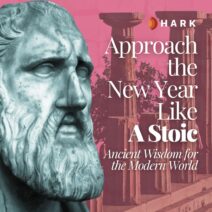Self-Control in Stoicism: Seneca’s Warning on False Ambitions

Why does self-control matter in Stoicism?
To practice self-control in Stoicism means directing your desires toward what is truly good, virtue, instead of chasing externals that can harm you when attained.
“But this is the result of an excessive lack of self-control and blind love for some commodity; for when a man seeks bad things instead of good it is dangerous for him to attain his ambitions.”
Seneca, Dialogues and Essays, On the Happy Life, 14
Modern life often encourages us to pursue more: more money, more recognition, more comfort. Yet Seneca reminds us that without self-control, our ambitions can destroy us. If we love the wrong things, achieving them is not a blessing but a curse. Self-control in Stoicism protects us from this trap by helping us focus only on what truly matters: the development of our character.
The Stoic view of self-control
Self-control is essential in Stoicism because it prevents us from mistaking externals, wealth, status, and possessions for genuine goods. By exercising moderation and inner discipline, we avoid being enslaved by desires. This restraint is not about denial but about freedom: choosing wisely so we can live in harmony with reason and nature.
Here are three ways to build Stoic self-control:
- Pause before desiring – Ask yourself if what you want will improve your character or merely provide temporary satisfaction.
- Reframe ambition – Focus on virtue as your highest aim rather than chasing wealth or recognition.
- Practice contentment – Train yourself to be satisfied with what you already have, reducing the pull of harmful desires.
Self-control in Stoicism is a practice of freedom. It ensures that our ambitions do not trap us and that our lives remain aligned with wisdom and virtue.
FAQ
What does Seneca mean by self-control?
Seneca teaches that self-control means restraining harmful desires and aiming only for what is truly good: virtue.
Why is self-control central in Stoicism?
Because without self-control, desires for wealth, fame, or pleasure can enslave us, leading us away from wisdom and inner freedom.
How can I practice Stoic self-control?
You can practice by pausing before judgment, reframing your goals around virtue, and practicing daily gratitude for what you already have.
Want to explore more Stoic practices?
Book a free consultation with one of our Stoic Coaches or read more on the Seneca Quotes page. You can also listen to the Via Stoica podcast on Spotify or Apple Podcasts or watch it on YouTube.
Author Bio
Benny Voncken is the co-founder of Via Stoica, where he helps people apply Stoic philosophy to modern life. He is a Stoic coach, writer, and podcast host of The Via Stoica Podcast. With almost a decade of teaching experience and daily Stoic practice, Benny creates resources, workshops, and reflections that make ancient wisdom practical today.
Related Posts
-
 Greek Stoic Philosophy Terms
Greek Stoic Philosophy TermsWhat Is Ekklisis? The Stoic Art of Avoiding What Harms Your Character
What Is Ekklisis? Ekklisis in Stoicism is the rational refusal to engage with what would damage one’s moral choice. The Stoic meaning of ekklisis is important because it teaches us what to turn away from, not out of fear, but out of commitment to living well. In daily life, ekklisis helps us step back from […]
Read more -
 Via Stoica Podcast
Via Stoica PodcastA Hark Audio Curated Stoic Playlist for 2026
At the start of a new year, there is often an unspoken promise that things will somehow be different. Calmer. More ordered. More predictable. Yet life rarely follows that script. Delays disrupt flights, plans break down, people drift away, and life brings events we cannot control. What we can work on, and what Stoicism has […]
Read more -
 Book Reviews
Book ReviewsThe Stoic Leader by John Sellars and Justin Stead
The Stoic Leader introduces Stoicism as a practical philosophy and explores how its principles shape leadership, judgment, and character in both work and life. Summary Written by John Sellars and Justin Stead, The Stoic Leader offers what is effectively two books in one. Sellars provides an introduction to Stoicism and its philosophical foundations, while Stead […]
Read more


Comments 0